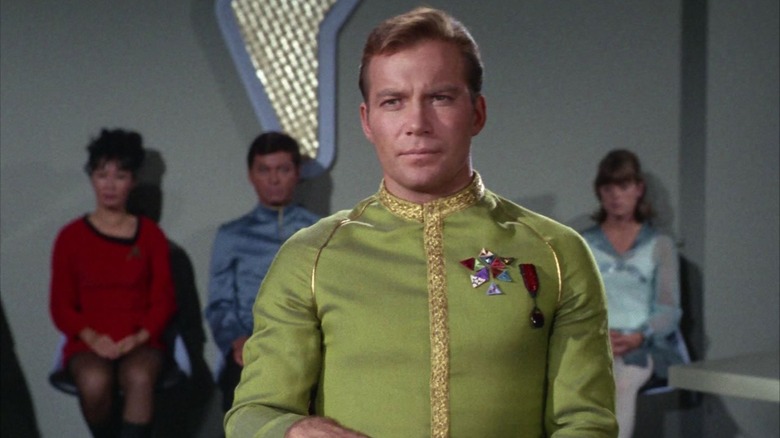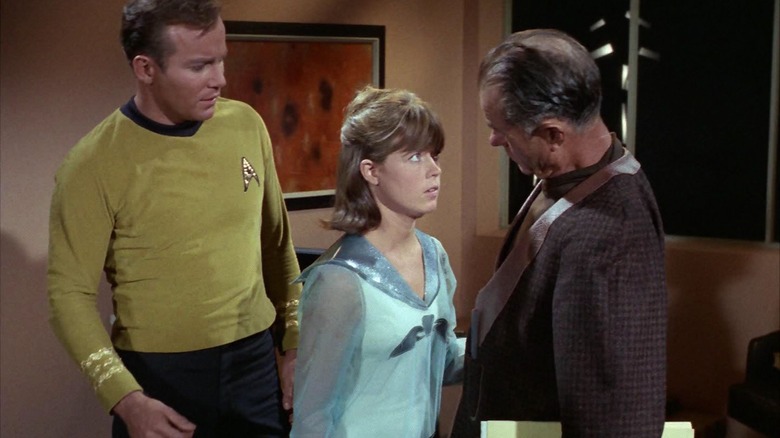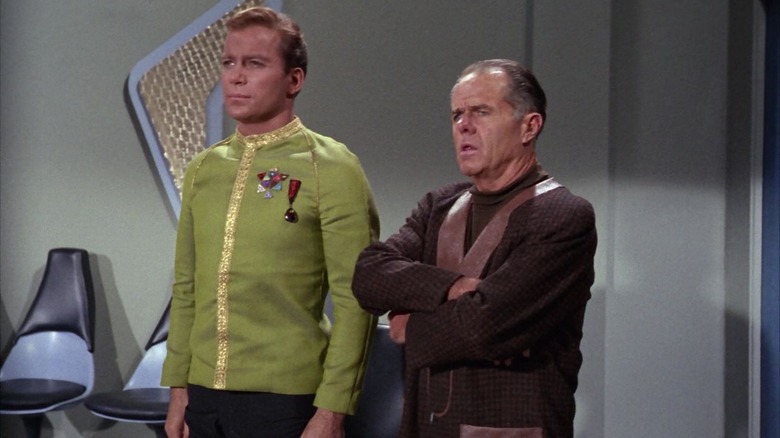Cutting Just One Scene Turned Star Trek's Court Martial Into A Confusing Mess
In the "Star Trek" episode "Court Martial" (February 2, 1967), Captain Kirk (William Shatner) is brought on trial following the death of one of his officers, Lieutenant Commander Finney (Richard Webb). The U.S.S. Enterprise had encountered an ion storm and was being buffetted so badly it faced potential destruction. To flee the damage, Kirk had to eject a research vessel while Finney was still on board, sending his officer to his death.
This was a difficult command decision, of course, but there was some debate as to whether or not Kirk ejected the vessel while the Enterprise was at red alert, or if Kirk panicked and ejected the vessel while the Enterprise was still at yellow alert. The latter would be seen as grounds for incompetence and Kirk would be ejected from Starfleet. There is a computer record of Kirk's reaction, including a video, showing he did indeed act hastily, but Kirk and Spock (Leonard Nimoy) maintain that Kirk was in the right and that there may, however unlikely, be something wrong with the computer. This is a stance complicated that Finney's teenage daughter Jame (Alice Rawlings) is present ... and is wholly convinced Kirk acted hastily. Late in the episode, Jame will have a sudden — and unexplained — change of heart.
The actual results of the trial I will leave for the reader to discover.
According to Marc Cushman's book "These Are the Voyages: TOS, Season One," Jame's sudden change of heart was actually explained in the episode's script, written by Don M. Mankiewicz. There was, it seems, a whole scene wherein Kirk and Jame had a conversation as to why Kirk had to clear his name in court. Kirk explained that doubt had to be erased entirely for both of their sakes.
Jame and Kirk
The scene, as described in Cushman's book, went as follows: Jame confronts Kirk in a hallway before the final leg of his trial is set to begin. Jame asks Kirk why he didn't settle without a trial. She felt that Kirk could easily have given up his command — a less harsh punishment than the one proposed by the court — and waited a few years before resuming his career again. The trial, Jame felt, was merely making things emotionally messy for everyone. Kirk's speech was as follows:
"He didn't convince me of anything. He told me there was a chance this could be settled without a trial. I just want you to know, if you do decide to, well, to transfer to ground duty instead of standing trial, I won't make trouble. [...] Jame, I'll tell you something I don't believe I could say to any other human being. What they believe I did is a lie ... But... for the first time in my life that I can remember, I'm afraid. The bridge of a ship — that's my world, my strength. Jame, they can take away my command permanently. And if they do that, they take away my life."
Kirk admitting he was scared is certainly out of character for him. Kirk, even when afraid, always felt he needed to project machismo and bravery in order to lead effectively and inspire his crew. He was so well-trained in this regard, he couldn't imagine a life where the courts took it away from him. Jame responded to Kirk by saying, "Then don't let them! Don't ask for a trial. Let a year, or two, or three go by. This will be forgotten; they'll give you another ship."
Kirk's rebuttal explained everything.
Jame's arc
Kirk says to the teen: "No, Jame. They don't forget. They never forget ... And you wouldn't forget, would you? In the back of your mind, there'd always be that suspicion: 'Did he kill my father?' ... That's true, isn't it, Jame?"
The scene then ends with Jame weeping, knowing that Kirk was correct. Both she and Kirk required that the truth be found out. If Kirk could prove to Jame that he was innocent, then she would achieve some closure. This scene would have made Jame's presence late in the episode, and her subsequent change of attitude toward Kirk, more logical. The scene was altered in a novelized version to bring Jame on board the Enterprise after Kirk had a chance to prove himself. The original scene was not restored.
Why was it cut in the first place? It seems that "Star Trek" creator Gene Roddenberry objected. Kirk, he felt, was a stalwart fellow who only opened up emotionally to his best friends Spock and Dr. McCoy (DeForest Kelley). Kirk, Roddenberry felt, wouldn't admit fear to a teenager he barely knew.
There were plans to work some of the above scene's dialogue into the final draft of the teleplay as a voice-over narration, but shooting "Court Martial" was so swift, that there wasn't enough time to make the proper amendments. The episode's denouement, involving Jame, was likewise reduced to a mere narration instead of a filmed scene. The episode hangs together well enough, but the above amendments would have made it so much better, allowing Kirk to be vulnerable and for Jame's arc to conclude satisfyingly.
Don Mankiewicz, naturally, hated the final aired version.


